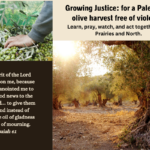In honour of Spiritual & Religious Care Awareness Week: October 17-23, 2021, Regina Spiritual Care Providers offer us this reflection. Chaplain Angela Fraser, Reverend Lorna King, Reverend Jennifer Holtslander serve in hospitals in the Regina area; Rev Lorna King is the chaplain with Living Skies’ South Hospital Chaplaincy, a ministry that serves well beyond the United Church and its members, and is supported by your Mission and Service givings, and by congregational and personal donations.
For an additional perspective on hospital chaplaincy and spiritual care during COVID, please also see this CBC article.
Spirituality Supporting Resilience: Taking Care of your Spiritual Health
Spirituality is a complex and diverse part of people’s lives. Sometimes, it can be difficult to know where to begin to address questions about one’s spirituality. Take time to seek out a Spiritual Care Provider, clergy person, relative, good friend, or another trusted individual to have an open discussion.
Being spiritually at peace and having good Spiritual Care have been documented as having positive outcomes for our physical, mental and emotional health. During Spiritual Care Week, we encourage you to take good care of your spiritual health.
Some healthcare facilities have Spiritual Care Providers (often called Chaplains) who are available not only to patients and residents, but also to staff members. They are available to answer questions, to speak with you, pray with you, or just listen to your cares and concerns.
Move to the beat!
Human beings have physical, mental, emotional, and spiritual needs.
During a pandemic, when our physical health is threatened, and the demands on our time and energy are high, we can become so overwhelmed that we neglect the other options for nurturing our well-being.
Because all the aspects of our being are inter-dependent, and each aspect impacts the others, bumping up our self-nurture and community care can help us to grow our resilience.
Music often lifts our spirits and speaks to us in ways that mere words cannot. Take time to listen to music that lifts your spirit. Try making yourself a playlist that contains songs that make you feel happy and more positive. Smiling, singing, tapping your feet, or dancing along to the music will help your whole body feel better.
Wholeness
Health means wholeness – body, mind and spirit.
In times of stress, illness, trauma, and loss, a person’s beliefs, values and feelings are important aspects to consider. The spirit is the part of every person that seeks meaning, purpose, hope, and love. It is important to nurture our spirits to foster wholeness.
Reflecting on what matters most can help us to reset our inner world as we offer ourselves compassion. Today as you sanitize your hands, take those seconds of sanitizing to breathe and honour the spiritual part of you with a moment of gratitude.
Take time for Spiritual Practices
When there is uncertainty and turmoil around us, our spirit can become discouraged and downcast.
At such times, it is important not to neglect our spiritual practices so that we can sustain a hopeful outlook on life. Make sure to take time – even five minutes — for prayer, meditation, reading of spiritual texts, or whatever other practices keep you hopeful and grounded in times of turmoil.
In these times, spiritual idealism can become the enemy of the small daily practices that will lead to more spiritual resilience. Better a five-minute conversation with a supportive person, or a ten-minute prayer session, than putting off the opportunity until there is an hour for rest.
Call on one of the local Spiritual Care Providers in your community today if you are looking for spiritual care support.
Spiritual Care in times of Moral Distress
Do you find yourself reacting more strongly than usual to certain situations or certain individuals?
If this is becoming a common occurrence, take time to explore the circumstances surrounding your reaction: are you overreacting due to stress, lack of sleep, or working long hours? Or is it something deeper than that?
Moral distress can occur when one of our core values is violated.
For example, if you deeply value caring for and preserving human life, and you feel that some decisions being made during the pandemic are putting lives at risk, how do you deal with that? Contemplating having to implement triage to determine which patients will have access to care in ICU may feel like the total opposite of everything that drew you to helping others through your healthcare role.
If your reactions are becoming distressing for you or others around you, professional help in the form of a counsellor, chaplain, therapist or other professional may be needed.





